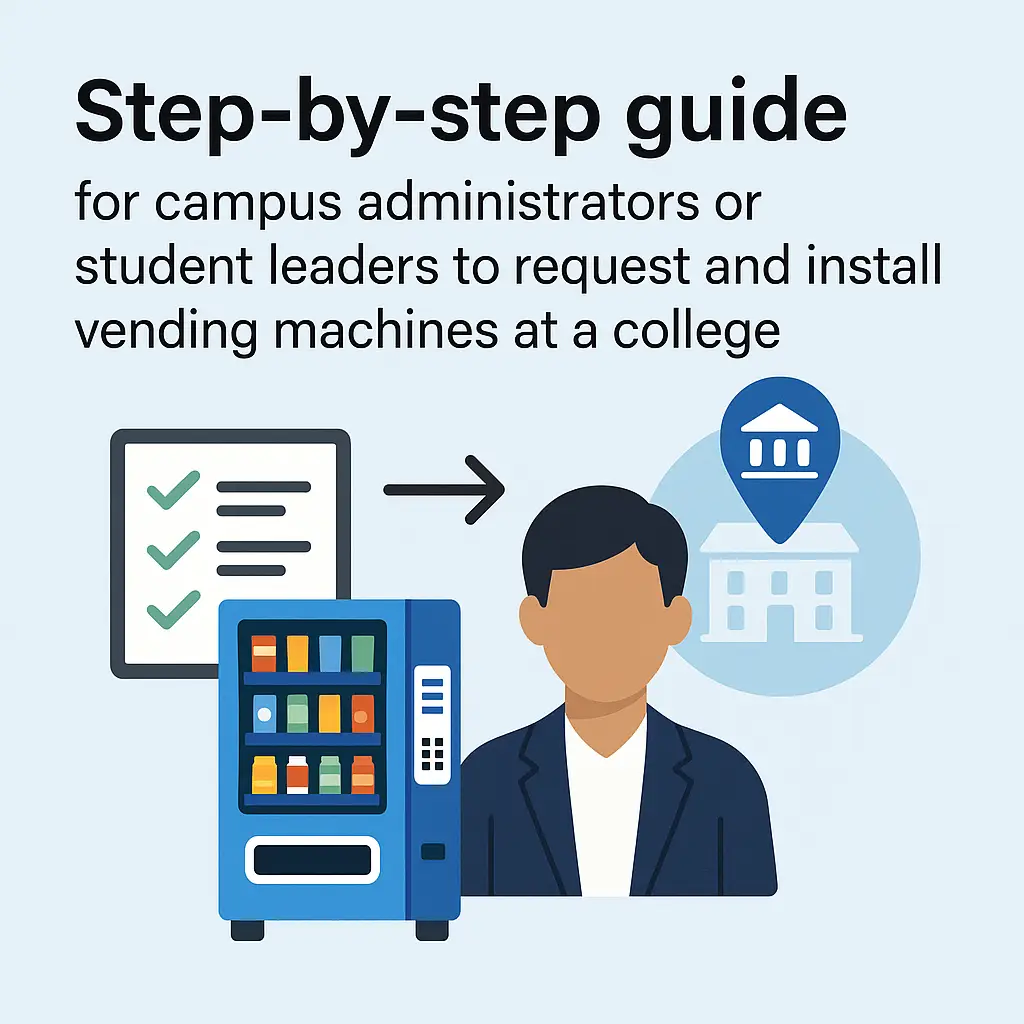How to Get Vending Machines on Your Campus
Step-by-step guide for campus administrators or student leaders to request and install vending machines at a college.
Back to Vending for Colleges ResourcesStep-by-step guide for campus administrators or student leaders to request and install vending machines at a college.
Back to Vending for Colleges ResourcesAdding vending machines requires approval, location planning, product selection, and a clear plan for ongoing servicing to ensure students and staff have reliable access.
![]() Campus machines require approvals for placement and student access
Campus machines require approvals for placement and student access
![]() Healthy product mix supports student wellness and satisfaction
Healthy product mix supports student wellness and satisfaction
![]() Clear maintenance plans reduce machine downtime on campus
Clear maintenance plans reduce machine downtime on campus

Adding vending machines to a college campus can provide students and staff with convenient access to food and beverages throughout the day. Understanding the process, from planning to installation, helps ensure that machines are well-placed, properly stocked, and aligned with campus needs. This guide breaks down the essential steps for administrators and student leaders who are evaluating vending options.
The first step is to determine demand. Consider high-traffic areas such as dormitories, libraries, or student centers. Conducting informal surveys can help identify the types of products students prefer, such as quick snacks, drinks, or healthier alternatives. This evaluation will also guide decisions about whether standard vending machines, modern smart machines, or even micro markets are most appropriate for your campus.
Campuses typically require administrative or facilities approval before installing machines. Work with leadership to identify approved locations and ensure compliance with building policies. Placement decisions should balance convenience with accessibility while minimizing disruptions. For example, machines in academic buildings may support late-night study sessions, while residence hall placements serve students where they live.
Today’s students often expect a mix of both traditional and healthy options. Including water, low-sugar drinks, and nutritious snacks supports campus wellness initiatives. It’s also worth exploring sustainable or locally sourced product selections that align with student values. To learn more about how product mix can shape satisfaction, review insights from student fundraising programs.
Reliable servicing is critical for campus vending. Machines must be restocked regularly, and issues such as malfunctions or expired products should be addressed quickly to avoid dissatisfaction. Administrators should ensure expectations for restocking frequency and repair response times are clearly defined. For additional considerations on reliability, see our overview of contract standards for universities.
Once planning is complete, installation can often be finalized within a short period. Setup involves delivery, placement, and ensuring payment systems are fully functional. Contactless and mobile payments are increasingly important on campuses, so confirming these features are available ensures machines align with student expectations.
If you're exploring vending options for your business, Vending Exchange can help simplify the process. Delivery, Installation and Equipment is provided at no cost to you - vendors provide the machines, keep them stocked, and handle all servicing. Whether you need a provider or full-service management, just fill out the form on this page to get started.
Most campuses require administrative or facilities approval before machines can be installed.
High-traffic areas such as dorms, libraries, and student centers typically see the most use.
Installation is usually completed within a week after placement and product decisions are finalized.
Yes, machines can be stocked with water, low-sugar drinks, and nutritious snack options.
Maintenance schedules and repair response times should be outlined during the setup process.
Yes, mobile wallets and card payments are increasingly expected and reduce cash handling concerns.
Service agreements should define restocking frequency and accountability for product freshness.
Yes, machines in study halls and lecture buildings support students during long hours on campus.
Popular items include drinks, quick snacks, and ready-to-eat meals for convenience.
Yes, some arrangements can include revenue-sharing programs that support student activities.